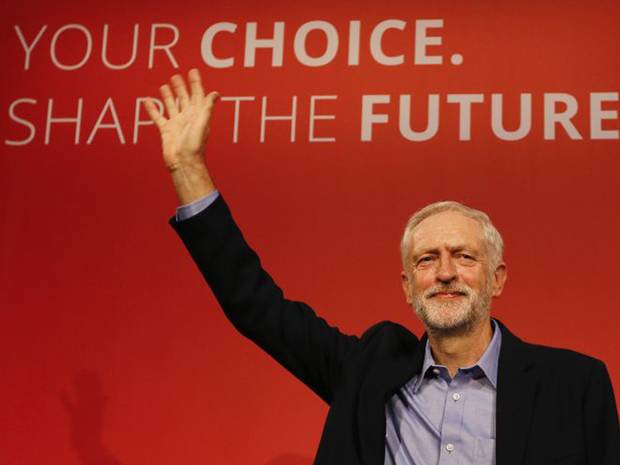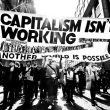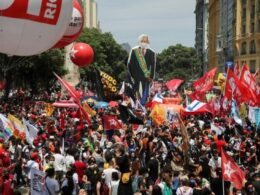Below is a statement by Socialist Party’s sister party in England and Wales on the victory of Jeremy Corbyn in the Labour leadership election.
This is a historic moment. Nothing will be the same again. For decades Westminster politics has meant nothing but right-wing, pro-big business politics.
A handful of left Labour MPs like Jeremy Corbyn voted against austerity, war and the undermining of democracy but their isolated voices were largely drowned out.
Now the pro-austerity consensus has been smashed with Jeremy Corbyn’s election as leader of the Labour Party with 59.5% of the vote.
The hopes have been raised of millions who want to see a society for the 99% not the 1%.
The election of Jeremy Corbyn, however, is only the beginning. Throughout the election the right wing that dominates the Labour Party and the capitalist media have done everything in their power to try and stop Corbyn winning.
Tens of thousands of people have been ruled out of voting in the leadership election, overwhelmingly Corbyn supporters.
But nothing has worked, on the contrary the attacks on Corbyn from Blair, Brown, Mandelson and the rest have only increased his support.
Deeply disillusioned with the establishment politicians, hundreds of thousands of people have seized the opportunity created by Jeremy Corbyn’s presence on the Labour leadership ballot to begin to create a political voice for their anti-austerity views.
Even ultra-Blairite Liz Kendall was forced to admit that Corbyn had “mobilised and enthused vast numbers of people in a way we haven’t seen for decades.” In the face of that enthusiasm the Labour right has been forced back.
It is ruled out that the Labour right will accept defeat and simply allow the Labour Party to be shifted left by Corbyn and his supporters.
Legal challenges or immediate attempts to launch a coup against Corbyn still cannot be totally ruled out but are not likely given the scale of his victory.
It is clear, however, that the Labour right will attempt to imprison and undermine Corbyn with the aim of removing him as soon as possible.
In doing so they will have the full support of the capitalist establishment. Thatcher considered Blair and New Labour were her greatest success.
Labour had been transformed into a party that could be relied on to act in the interests of the 1%. There will now be a huge campaign, putting what has happened during the election into the shade, to try and once again make sure that the voice of the majority – the working class – is once again extinguished within the Labour Party.
How can onslaught from right be defeated?
Jeremy Corbyn will not be able to defeat the onslaught he will face if he remains isolated within the constraints of the right-wing dominated Labour Party machine.
There are only nine members of the socialist group of MPs of which he is a member. To win he needs to build on the popular movement against austerity that found a voice in his election campaign.
Much of his support has come from the ’outside’ – new members and registered supporters who were attracted by the hope of something different.
This is a new party in the process of formation. Many of those are a new generation of young people, alongside some returning former members.
As a starting point we would urgently encourage Jeremy Corbyn to organise a huge conference of all those who have voted for him, plus the many trade unions – including non-affiliated unions like the RMT, PCS and FBU – which support a fighting anti-austerity programme.
The Socialist Party would participate in such a conference and would encourage all other anti-austerity campaigners to do the same.
Part of the transformation of Labour into a pro-capitalist party has been the complete destruction of the democracy which previously existed.
Labour ’moderates’ are already bleating that the left would ’seize the party’s levers of power’ under Corbyn’s leadership.
What they mean by this is “giving more control over policy to the annual conference and the National Executive Committee and less influence to the Parliamentary Labour Party” (The Independent 11.09.15).
In other words restoring some of the party democracy that existed in the past! They are also hysterically attacking any attempt to re-select MPs.
Yet the right to re-select MPs just means the democratic right of a party’s members to replace an MP that has voted against the party’s policies.
That should be uncontroversial. However, it is not a surprise it upsets Labour MPs who have voted for welfare cuts, austerity and war.
Jeremy Corbyn should fight to implement every one of the democratic measures which so terrifies Labour’s right wing, including restoring the collective voice of the organised working class, via the trade unions, within the party.
At the same time the party should be opened up. All those who have been forced out or expelled in the past for fighting against cuts and for socialist ideas should be invited back.
The Corbyn campaign has raised the idea of using social media and virtual democracy to hold policy consultations.
Such methods can play a useful supplementary role but defeating the pro-big business elements that dominate the Labour machine will require mass, active participation.
Socialist ideas popular
The capitalist media has united in insisting that a Corbyn-led Labour Party is unelectable. They will do their best to make it so, but it isn’t true! On the contrary, the latest polling from Lord Ashcroft gives 52% of people agreeing that a ’radical socialist alternative would be a good thing’.
The population is far to the left of the establishment politicians. For example, 68%, 67% and 66% support renationalisation of the energy companies, the Royal Mail and the railway companies respectively.
The last general election has already shown the popularity of anti-austerity ideas. While ’austerity-lite’ Labour was almost annihilated in Scotland the SNP, despite implementing austerity policies in Scotland, was able to sweep the board by promising to oppose austerity in Westminster.
Meanwhile, despite hatred for the Con-Dem government, Labour in England and Wales was only able to regain the support of a million of the over four million votes it has lost since 1997.
Disillusioned Labour voters did not, in the overwhelming majority of cases, vote Tory but voted for parties that they saw as protesting against the establishment – or stayed at home and did not vote at all.
Jeremy Corbyn’s calls for nationalisation of rail and the energy companies, a £10 an hour minimum wage, free education, council house building, and repeal of the anti-union laws have already enthused millions.
Nonetheless, the programme Jeremy Corbyn’s campaign has presented in his written programme is actually quite limited.
He has raised the popular idea of a ’peoples QE’ but has not drawn all the conclusions about what would be necessary to implement such a policy.
He merely calls for ’meaningful regulation of the banking sector’ rather than for nationalisation of the banks under democratic control, for example.
Part of building a successful movement against austerity would be a democratic discussion on how to permanently defeat it.
Within such a discussion the Socialist Party would argue that would require the need for the nationalisation – under democratic working class control – of the major companies and banks that dominate the economy.
Only in this way would it be possible to begin to build a democratic socialist society planned to meet the needs of the majority instead of having, as at present, a society driven by maximising the profits of the 1%.
For councillors who fight the cuts
Local councils will be a central battleground in the struggle to create an anti-austerity party. Jeremy Corbyn has rightly made the call for councils to stand together and refuse to implement government cuts.
Over 450 councillors have signed up to support Jeremy Corbyn. This is significant, but it is barely 6% of the total number of Labour councillors.
Unfortunately, the majority of Labour candidates in the next year’s council elections will still be pro-austerity.
Council services have already been cut by 39%. We cannot accept Labour councillors continuing to slash more.
The experience of Syriza in Greece, where the leadership of an anti-austerity party capitulated to the pressure of big business and is now implementing austerity, shows that defeating austerity requires a determined struggle.
To accept pro-austerity Labour councillors continuing to slash jobs and services would be to prepare the ground for the defeat of the movement that has begun with Jeremy Corbyn’s election.
The Socialist Party is part of the Trade Unionist and Socialist Coalition (TUSC) which was co-founded by Bob Crow the late general secretary of the transport workers’ union (the RMT) in order to stand anti-austerity candidates in elections.
TUSC will assist in next year’s council elections, by supporting Labour candidates who clearly pledge to vote against cuts and at the time standing against those who say they will continue to axe local services.
For a mass party of the working class
Jeremy Corbyn’s victory has lifted the confidence of all those who oppose austerity and has already dealt a blow to the establishment.
However if the right succeed in containing and undermining him the danger is that those drawn around Corbyn’s campaign will become disillusioned and leave.
If he is removed at any stage it is vital that all the conclusions are drawn about the viability of Labour as a vehicle to continue the struggle against austerity.
We urgently need a mass party for the working class that can spearhead a struggle against austerity. The route to this is not straightforward.
But Jeremy Corbyn’s victory and, above all, the mobilisation of hundreds of thousands of anti-austerity young people and workers that have ensured that victory are an important step forward.












